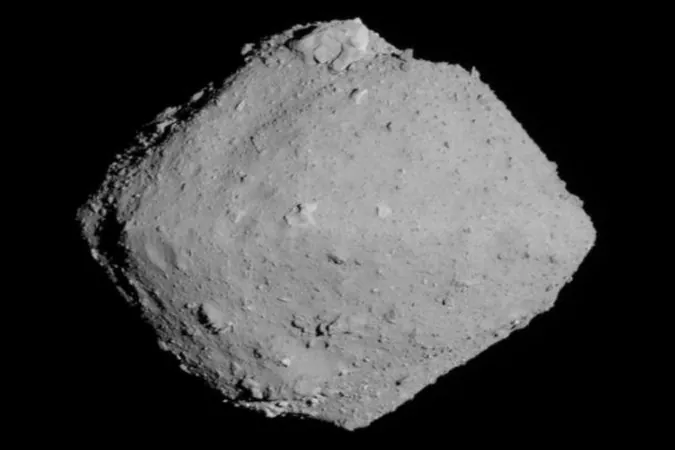
Shocking Discovery! Asteroid Sample Contaminated by Earthly Microorganisms!
2024-11-23
Author: Ling
Shocking Discovery! Asteroid Sample Contaminated by Earthly Microorganisms!
In an unprecedented revelation, researchers have found traces of microbial life in what was expected to be an uncontaminated asteroid sample. This alarming discovery raises serious concerns about the difficulty of preventing terrestrial contamination in space research.
A dedicated team from Imperial College London has uncovered a population of microorganisms in samples retrieved from the asteroid Ryugu by Japan's Hayabusa2 mission in 2019. Astonishingly, this microbial life was determined to have originated from Earth, indicating that the precious samples were compromised during their stay on our planet. The findings of this significant study have been published in the journal 'Meteoritics and Planetary Science.'
Typically, studies involving space rocks focus on meteorites that have fallen to Earth, where they inevitably succumb to various forms of contamination. These meteorites, while informative, are not pristine; by the time scientists analyze them, they've absorbed terrestrial microbes and other environmental impurities. However, missions like Japan's Hayabusa2 and NASA's OSIRIS-REx aimed to collect samples directly from asteroids to provide untainted material for research.
The Hayabusa2 spacecraft successfully collected approximately 5.4 grams of rock, dust, and pebbles from the asteroid Ryugu, located around 200 million miles from Earth. After completing its mission, the spacecraft delivered these samples in 2020, encapsulated in a protective capsule that made a soft landing in the Woomera Range Complex of South Australia.
To ensure the integrity of the samples, they were immediately taken to a specially designed facility in Sagamihara, Japan, where scientists went to great lengths to prevent contamination. The samples were first opened in a vacuum chamber and then transitioned to a nitrogen-filled room intended to keep out Earthly pollutants. Carefully, these bits of asteroid material were placed into nitrogen containers before being distributed to researchers worldwide for detailed analysis.
Upon examining their unique sample from Ryugu, the researchers noted the presence of organic matter represented by thin, thread-like microorganisms. Their origins were traced back to terrestrial life, confirming suspicions of contamination despite stringent protocols in place.
Interestingly, NASA's recent sample retrieval from the asteroid Bennu followed similar protective measures as the Hayabusa2 mission but, thus far, no Earthly microorganisms have been detected in those samples, suggesting varying levels of success in avoiding contamination across different missions.
Ryugu, classified as a carbonaceous asteroid, is believed to be among the primordial materials that constitute the building blocks of our solar system. By studying these asteroids in controlled laboratory environments, scientists aim to unravel the mysteries of the solar system's formation and the origins of life on Earth. Preliminary analyses of Ryugu samples have already unveiled organic molecules, hinting that the essential ingredients for life may have arrived on our planet through asteroid and meteorite impacts.
While sample return missions present a once-in-a-lifetime opportunity for groundbreaking discoveries about our solar system, this latest incident illuminates the immense challenges of maintaining sample purity. As scientists continue to push the boundaries of space exploration, the task of safeguarding extraterrestrial materials from earthly contaminants remains fraught with complexity and urgency. Could we be witnessing the dawn of a new era in astrobiology, or are we doomed to repeat history? The future of interplanetary research hangs in the balance!


 Brasil (PT)
Brasil (PT)
 Canada (EN)
Canada (EN)
 Chile (ES)
Chile (ES)
 España (ES)
España (ES)
 France (FR)
France (FR)
 Hong Kong (EN)
Hong Kong (EN)
 Italia (IT)
Italia (IT)
 日本 (JA)
日本 (JA)
 Magyarország (HU)
Magyarország (HU)
 Norge (NO)
Norge (NO)
 Polska (PL)
Polska (PL)
 Schweiz (DE)
Schweiz (DE)
 Singapore (EN)
Singapore (EN)
 Sverige (SV)
Sverige (SV)
 Suomi (FI)
Suomi (FI)
 Türkiye (TR)
Türkiye (TR)